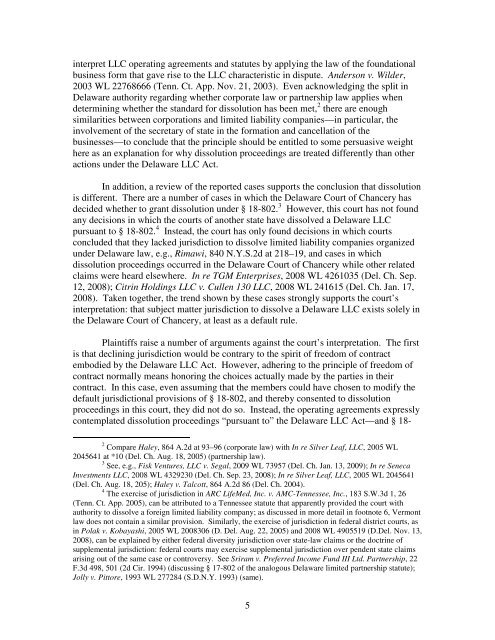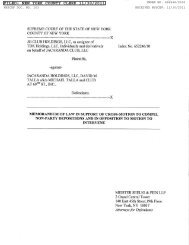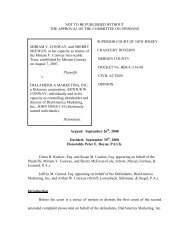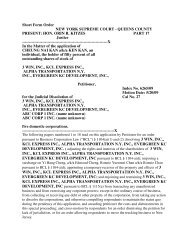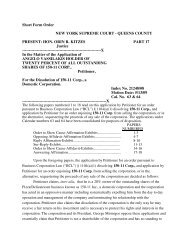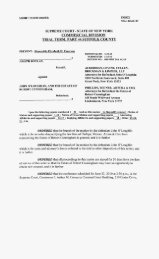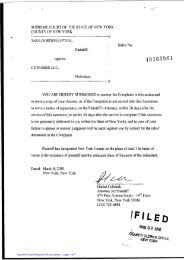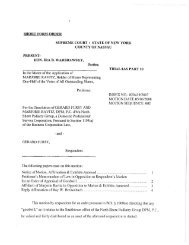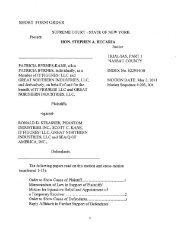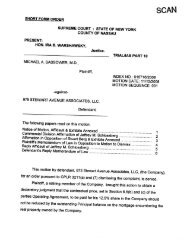Casella Waste Systems, Inc. v. GR Technology, Inc., Decision and ...
Casella Waste Systems, Inc. v. GR Technology, Inc., Decision and ...
Casella Waste Systems, Inc. v. GR Technology, Inc., Decision and ...
- No tags were found...
You also want an ePaper? Increase the reach of your titles
YUMPU automatically turns print PDFs into web optimized ePapers that Google loves.
interpret LLC operating agreements <strong>and</strong> statutes by applying the law of the foundationalbusiness form that gave rise to the LLC characteristic in dispute. Anderson v. Wilder,2003 WL 22768666 (Tenn. Ct. App. Nov. 21, 2003). Even acknowledging the split inDelaware authority regarding whether corporate law or partnership law applies whendetermining whether the st<strong>and</strong>ard for dissolution has been met, 2 there are enoughsimilarities between corporations <strong>and</strong> limited liability companies—in particular, theinvolvement of the secretary of state in the formation <strong>and</strong> cancellation of thebusinesses—to conclude that the principle should be entitled to some persuasive weighthere as an explanation for why dissolution proceedings are treated differently than otheractions under the Delaware LLC Act.In addition, a review of the reported cases supports the conclusion that dissolutionis different. There are a number of cases in which the Delaware Court of Chancery hasdecided whether to grant dissolution under § 18-802. 3 However, this court has not foundany decisions in which the courts of another state have dissolved a Delaware LLCpursuant to § 18-802. 4 Instead, the court has only found decisions in which courtsconcluded that they lacked jurisdiction to dissolve limited liability companies organizedunder Delaware law, e.g., Rimawi, 840 N.Y.S.2d at 218–19, <strong>and</strong> cases in whichdissolution proceedings occurred in the Delaware Court of Chancery while other relatedclaims were heard elsewhere. In re TGM Enterprises, 2008 WL 4261035 (Del. Ch. Sep.12, 2008); Citrin Holdings LLC v. Cullen 130 LLC, 2008 WL 241615 (Del. Ch. Jan. 17,2008). Taken together, the trend shown by these cases strongly supports the court’sinterpretation: that subject matter jurisdiction to dissolve a Delaware LLC exists solely inthe Delaware Court of Chancery, at least as a default rule.Plaintiffs raise a number of arguments against the court’s interpretation. The firstis that declining jurisdiction would be contrary to the spirit of freedom of contractembodied by the Delaware LLC Act. However, adhering to the principle of freedom ofcontract normally means honoring the choices actually made by the parties in theircontract. In this case, even assuming that the members could have chosen to modify thedefault jurisdictional provisions of § 18-802, <strong>and</strong> thereby consented to dissolutionproceedings in this court, they did not do so. Instead, the operating agreements expresslycontemplated dissolution proceedings “pursuant to” the Delaware LLC Act—<strong>and</strong> § 18-2 Compare Haley, 864 A.2d at 93–96 (corporate law) with In re Silver Leaf, LLC, 2005 WL2045641 at *10 (Del. Ch. Aug. 18, 2005) (partnership law).3 See, e.g., Fisk Ventures, LLC v. Segal, 2009 WL 73957 (Del. Ch. Jan. 13, 2009); In re SenecaInvestments LLC, 2008 WL 4329230 (Del. Ch. Sep. 23, 2008); In re Silver Leaf, LLC, 2005 WL 2045641(Del. Ch. Aug. 18, 205); Haley v. Talcott, 864 A.2d 86 (Del. Ch. 2004).4 The exercise of jurisdiction in ARC LifeMed, <strong>Inc</strong>. v. AMC-Tennessee, <strong>Inc</strong>., 183 S.W.3d 1, 26(Tenn. Ct. App. 2005), can be attributed to a Tennessee statute that apparently provided the court withauthority to dissolve a foreign limited liability company; as discussed in more detail in footnote 6, Vermontlaw does not contain a similar provision. Similarly, the exercise of jurisdiction in federal district courts, asin Polak v. Kobayashi, 2005 WL 2008306 (D. Del. Aug. 22, 2005) <strong>and</strong> 2008 WL 4905519 (D.Del. Nov. 13,2008), can be explained by either federal diversity jurisdiction over state-law claims or the doctrine ofsupplemental jurisdiction: federal courts may exercise supplemental jurisdiction over pendent state claimsarising out of the same case or controversy. See Sriram v. Preferred <strong>Inc</strong>ome Fund III Ltd. Partnership, 22F.3d 498, 501 (2d Cir. 1994) (discussing § 17-802 of the analogous Delaware limited partnership statute);Jolly v. Pittore, 1993 WL 277284 (S.D.N.Y. 1993) (same).5


